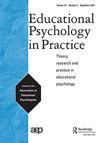Learning from supervisor experience of increased virtual supervision for educational psychologists
IF 1
Q4 PSYCHOLOGY, EDUCATIONAL
引用次数: 0
Abstract
ABSTRACT This research explored the experiences of supervisors of educational psychologists (EPs) and trainee EPs (TEPs), using an increase in virtual methods of supervision, first undertaken during the Covid-19 restrictions within one Local Authority (LA) in England. Eleven supervisors in different roles, with varying lengths of experience, were supervising a range of EP positions and contributed to the online semi-structured questionnaire, which focused on supervision delivery, opportunities, challenges, and contextual factors. The responses were analysed using thematic analysis, with a number of themes identified. Key conclusions related to value of supervision, differences in supervisory practice, adequate experience, and support for TEP development and competence including newly qualified EPs, emotional impact of supervising while working remotely, supervisor and supervisee wellbeing, and technological considerations. Implications for practice are explored.向导师学习教育心理学家强化虚拟监督的经验
摘要本研究探讨了教育心理学家(EP)和受训EP(TEP)的监管人员的经验,使用了虚拟监管方法的增加,首次在新冠肺炎限制期间在英格兰一个地方当局(LA)内进行。11名具有不同职位、不同经验的主管正在监督一系列EP职位,并对在线半结构化问卷做出了贡献,该问卷侧重于监督实施、机会、挑战和背景因素。对答复进行了专题分析,确定了一些主题。关键结论涉及监督的价值、监督实践的差异、充足的经验以及对TEP发展和能力的支持,包括新获得资格的EP、远程工作时监督的情感影响、监督人和被监督人的幸福感以及技术考虑。探讨了对实践的启示。
本文章由计算机程序翻译,如有差异,请以英文原文为准。
求助全文
约1分钟内获得全文
求助全文

 求助内容:
求助内容: 应助结果提醒方式:
应助结果提醒方式:


